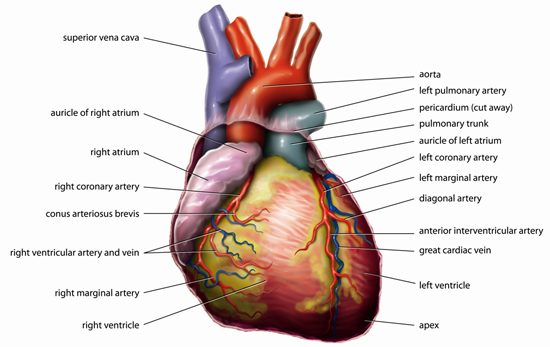Ten Ways to Control or Prevent High Blood Pressure
Hypertension can Lead to Cardiac Disease, Stroke, Diabetes but can be Controlled by Lifestyle and Medication
Copyright © 2011 Kelly Smith All rights reserved; content may not be copied, rewritten, or republished without author’s written permission; Author’s Google profile Posted May 30, 2011
.


This health-threatening condition is officially known as hypertension, but is also known as “the silent killer”. Why silent? Because it doesn’t really give any indications of its presence. Untreated, it can lead to heart disease, stroke, diabetes, and more.
Your blood pressure is rated as systolic (pressure when the heart beats, or in the pumping phase) and diastolic (pressure when the heart is resting). These numbers are represented in a fraction-type form, with the systolic number above and the diastolic number below. “Normal” is considered to be 120/80 mmHg.
How to Control Hypertension
If you don’t have it (from 1 in 3 — 1 in 5 Americans have it, depending on who you ask), consider yourself lucky and follow these steps to help prevent it. If you do have it, taking these steps collectively will minimize prescribed medications, which have bad side effects.
- Get your yearly check-up. — Since this is likely the only way to know if you have it, or to have your doctor analyze your current numbers are, this is critical. You can also monitor it at home with a simple device.
For example, the Omron BP785 takes 3 consecutive readings and averages them together to ensure accuracy. It also keeps your readings in memory so you can review and look for trends. - Stay at a healthy weight. — This is something we should all be doing anyway. Losing weight will lower pressure, and gaining too much weight can lead to type-2 diabetes for some people.
- Quit smoking. — Smoking (especially in conjunction with obesity) is one of the major causes of hypertension.
- Make exercise a healthy habit. — This, of course, is linked to diet and weight. Recommendations are all over the place, but a safe bet is 4 to 6 days a week, 30 to 60 minutes each time. Running, walking, and stair climbing can be done almost anywhere.
For the best in variety, join a local gym or health club. The benefit here is that you can mix up your routine to avoid boredom and burn-out. Try the machines, free weights, and swimming, if they have a pool.
- Adopt and stay on a healthy diet. — The food pyramid seems to be revised every few years or so, but the best idea is a balanced diet free of overly-processed food. Buy organic when possible and avoid genetically modified food.
- Limit your alcohol consumption. — The heart-healthy benefits of red wine are well-established, but don’t overdo it. A daily libation of your favorite adult beverage may reduce stress, which is a plus. The general guidelines are 1 drink a day for females; 2 for men.
- Minimize your salt consumption. — This is the one most often associated with blood pressure control. It doesn’t just mean putting the shaker down; simply eating grocery store food will give you your daily recommended average.
- Reduce your stress level. — Don’t be a workaholic, take time to relax, meditate, or take a well-deserved nap. Fortunately, since you are now exercising regularly, your stress level is already lowering.
- Limit caffeine? — The jury is still out on this one. Reports on both sides have come out. But if it suits you, err on the side off caution.
- Use a RESPeRATE Ultra Blood Pressure Lowering Device
on a daily basis. — This device works by first monitoring your breathing rate, then using tones through ear buds, gradually lowering the number of breathes per minute. This relaxes the walls of your blood vessels, which lowers the pressure.
By using it on a daily basis the effect is cumulative. It is a great alternative/supplement to prescription medication.
Types of Blood Pressure Medications
If adopting the lifestyle changes above don’t get your hypertension under control, your doctor will most likely prescribe medicine. There are a variety of types, each with a range of strengths. On the low end are water pills (diuretics), designed to flush excess water and sodium.
Next in line are ACE inhibitors. These prevent a hormone called angiotensin, which widens blood vessels. Then there are Angiotensin II receptor blockers, which act in a similar manner. Beta blockers function by blocking certain nerve and hormonal messages going to your heart and blood vessels.
Calcium channel blockers prevent calcium from going into heart and blood vessel muscle cells. This makes the cells relax, reducing the pressure. Finally we have the class of medications known as Renin inhibitors. What is Renin? It’s an enzyme made by your kidneys which initiates a chain of chemical actions that increase blood pressure.
More Health and Wellness Articles
- Just What is Holistic Medicine?
- The Facts on Performance Enhancing Supplements Marketed to Runners
- The Glycemic Index is the Key to Energy and Endurance
- Easy Whole Wheat High Fiber Pizza Crust
Website © 2012 KSmith Media, LLC; all rights reserved; content may not be copied, rewritten, or republished without written permission; Webmaster’s Google profile